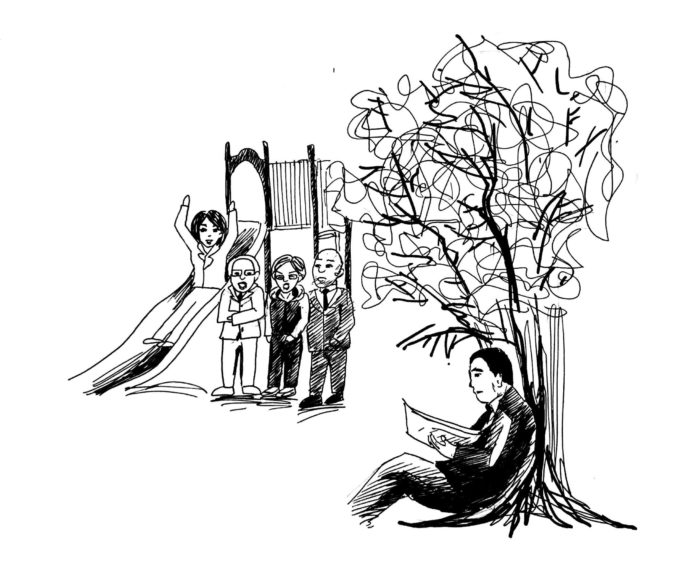Most readers will be familiar with the following scene: it is lunchtime at an elementary school. The day is ripe for enjoyment — only a cloud or two decorate the sky, and the summer heat has waned away. The sound of the bell prompts a horde of children to charge out the doors, and at once they begin to squabble over lunch spots, ball game rules, playground territory and other such trivialities. But off to the side, lounging under a large oak, is a young loner engrossed in a book. He’s not terribly hard to spot, and perhaps that’s precisely why none of the other children pay him much mind.
Yet, if we were to look at all these children, only one seems to be truly capable of independent thought — the child under the tree. And just as in the case of the school, the playground that is the Democratic debate stage possesses only one independent thinker — Andrew Yang.
Most people know Yang as “that one Asian guy” who decided to run for president of the United States; others know him as the man who promised to give $1000 a month to every American adult over the age of 18 as part of his Freedom Dividend, also known as Universal Basic Income (UBI). The goal of this handout is to reduce the negative impacts of automation on the American job market.
With the development of artificial intelligence, more and more menial jobs are disappearing. And because people have specialized fields of work, it becomes difficult for them to simply “adapt” to a new job. UBI would alleviate at least part of the troubles that accompany this Fourth Industrial Revolution. Yang distinguishes himself from the conventional Democratic politician with his insistence that everyone needs at least a basic level of income.
The part of Yang’s policy that has come under the greatest fire by skeptics is his most innovative one: a basic income. Various critics have questioned the feasibility of Yang’s proposal, particularly about generating money. And yet, as Yang has often pointed out, Alaska has offered an annual Permanent Fund to its residents (though the payout is only a thousand or so dollars a year).
Candidates such as Pete Buttigieg and Julián Castro have not brought any new policy proposals to the table, yet the mainstream media treats them as serious candidates. As for those who do bring more defined policies to the table, such as Bernie Sanders with his universal healthcare, and Elizabeth Warren with her demonopolization — let’s give credit where credit is due. Even so, both candidates’ platforms lack one critical feature that Yang provides.
Yang has also been criticized for his seeming populism, partly a result of his being labeled “The Internet’s Favorite Candidate.” Interviewers have questioned him about white supremacists being among his supporters, and they have criticized Yang for ignoring the legality of offering 10 people $1,000 a month to prove his point during a debate.
Such criticism does, however, seem to be both minor and infrequent. For the most part, Yang has galvanized support from all corners of the internet. Part of the reason Yang appeals to voters, such as myself, is because of a certain duality in his character — his values are very much his own, and he isn’t afraid to ignore social conventions to achieve his goals in the most straightforward manner. He pleases people precisely because he doesn’t try to do so consciously. It is this authenticity, combined with his long-term thinking and ability to devise a universally applicable system, that helps him appeal to so many voters.
Compare this to the populist rhetoric of Donald Trump — Trump purposefully appeals to the emotions of his voter base, but it is only as a means to achieve his own ends. This difference in psychology is a critical one, as it allows us to predict how either politician will act in office, and on the stage.
Given that Yang and Trump have radically different modes of cognition, it would be interesting to see how a debate between the two might play out. As he has usually done, Yang would focus on the future implications of his and Trump’s policies, repeatedly bashing the moral implications of Trump’s system. Trump would let loose a stream of consciousness in the form of unadulterated factual gibberish, backed up with his usual narcissistic logic. This is the point on which Yang would need to attack Trump’s arguments — Trump’s system is subjective, meaning it does not work for the entirety of the American populace.
My principal concern with the boy under the tree is that he is perfectly capable of confronting the playground ruffians, but appears unwilling to do so. If Yang has any real chance for Democratic Party leaders to take him seriously, he must walk over to the playground, and assert himself more frequently in an argument.
If there is one overarching criticism of Yang, it is that he is far too idealistic. But we must remember that it is often the most idealistic children who grow up to propel us into the future. For these reasons, I plan to vote for Andrew Yang in November 2020. You should too.
Anirudh Krishnakumar is an undeclared first year. He can be reached at akrishnakuma@oxy.edu.
![]()




































